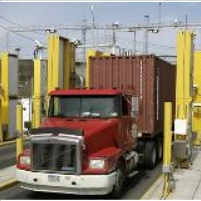Homeland Security Cancels $230 Million Radiation Detection Program
Thursday, July 28, 2011
 Advanced Spectroscopic Portal (photo: Frank Franklin II, AP)
Advanced Spectroscopic Portal (photo: Frank Franklin II, AP)
Realizing it made a big mistake, the Department of Homeland Security (DHS) has decided to cancel an expensive radiation-detection system intended to help customs officials foil terrorist attempts to smuggle nuclear bombs or material into the United States.
DHS spent $230 million over five years to develop the Advanced Spectroscopic Portal machine, which was supposed to not only detect radiation at ports and border crossings but also identify the kind of nuclear material being smuggled.
Each machine was ticketed to cost about $822,000, with the program expected to consume around $1.2 billion for 1,400 of the machines.
But the system suffered from multiple technological problems.
In January, the National Academy of Sciences issued a report that criticized Homeland Security for rushing to put the machines into operation even though the technology behind them was unproven.
DHS had 13 of the machines built, and it intends to use them to help officials figure out how to proceed in developing an alternative method of detecting radiation-based threats at the country’s ports of entry.
-Noel Brinkerhoff
Homeland Security Cancels Troubled Radiation Detector Effort (by Martin Matishak, Global Security Newswire)
Plan for Nuclear Bomb Detection Device Is Buy Now, Test Later (by Noel Brinkerhoff, AllGov)
- Top Stories
- Unusual News
- Where is the Money Going?
- Controversies
- U.S. and the World
- Appointments and Resignations
- Latest News
- Trump Changes Name of Republican Party
- The 2024 Election By the Numbers
- Bashar al-Assad—The Fall of a Rabid AntiSemite
- Trump Announces He Will Switch Support from Russia to Ukraine
- Americans are Unhappy with the Direction of the Country…What’s New?






Comments